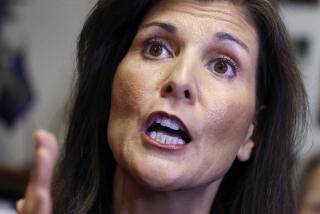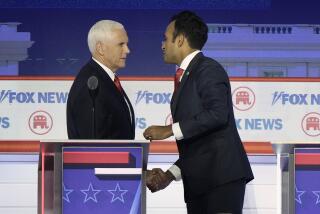Where do the Republican presidential candidates stand on Afghanistan?
Are Republicans rushing to President Obama’s left when it comes to Afghanistan?
Not quite. But as they calibrate their pitch to an increasingly war-weary nation, some of the GOP presidential hopefuls have signaled support for a more significant drawdown plan than the one the president is expected to unveil in a primetime address this evening.
That position, still evolving and with varying degrees of nuance, puts the candidates at odds with John McCain, the party’s 2008 nominee, who recently warned them against taking an “isolationist” stance.
War photos: A look back at Afghanistan
“There has always been an isolationist strain in the Republican Party,” McCain said on ABC’s “This Week,” “but now it seems to have moved more center stage. ... That is not the Republican Party that has been willing to stand up for freedom for people all over the world.”
McCain was referring in part to comments from nominal front-runner Mitt Romney, who said at last week’s GOP candidates’ debate in New Hampshire that “it’s time for us to bring our troops home as soon as we possibly can,” and that Americans should not be fighting a war of independence for the Afghan people.
Romney expanded in a media availability the next day.
“We will be looking to the Afghan people and the Afghan military and the Afghan civil leadership to step up to preserve what has been won for them,” he said, according to a transcript provided by his campaign. “Our soldiers have cleared, for the most part, the Taliban in major parts of the nation. Holding that independence, securing an independent nation is going to require bold and courageous leadership by the Afghan military, by their civil leadership and by the people. And that’s going to have to come from them, it’s not something that we can give.”
Romney rejected, however, the notion that military policy decisions should be made in response to domestic pressures, be they political or financial.
Photos: Potential 2012 GOP candidates
Jon Huntsman, the former ambassador to China under Obama, said in an interview with NBC on Wednesday that Obama should pursue a more “aggressive” strategy.
“We’ve been at this nine years and 50 days. We put Karzai in power. They’ve had democratic elections back in 2004. We’ve routed the Taliban. We’ve dismantled Al Qaeda,” he said. “What we need now is a healthy dose of nation-building here at home.”
Texas Rep. Ron Paul has been a consistent proponent of pulling all U.S. forces out of Afghanistan. As he explained in the CNN debate, “I’d bring them home as quickly as possible, and I’d get them out of Iraq as well.”
“Our national security is not enhanced by our presence over there. We have no purpose there. We should learn the lessons of history. And the longer we’re there, the worse things are, and the more danger we’re in as well, because our presence there is not making friends, let me tell you,” he said.
The exception at this point may be Tim Pawlenty, a newcomer to the national political scene and one without clear foreign policy experience. In an interview with Politico Tuesday, he criticized the president for making decisions based on politics.
“I supported ... President Obama’s surge of the troops, but I was very disappointed that he also simultaneously announced the withdrawal and deadline in the same speech,” he said. “I don’t think he should put arbitrary numbers and deadlines out there.”
He echoed McCain, the candidate he supported throughout the 2008 campaign, saying: “I don’t like the drift of the Republican Party toward what appears to be a retreat or a move more towards isolationism.”
Economic concerns seem to be trumping foreign policy at this stage of the 2012 nominating contest, unlike four years ago when McCain rode his “No Surrender” tour through New Hampshire in an effort to revive his campaign.
A new Pew Research Center survey found that 56% of those polled want the United States to remove troops from Afghanistan as soon as possible, including 43% of self-identified Republicans.
More to Read
Get the L.A. Times Politics newsletter
Deeply reported insights into legislation, politics and policy from Sacramento, Washington and beyond. In your inbox three times per week.
You may occasionally receive promotional content from the Los Angeles Times.







